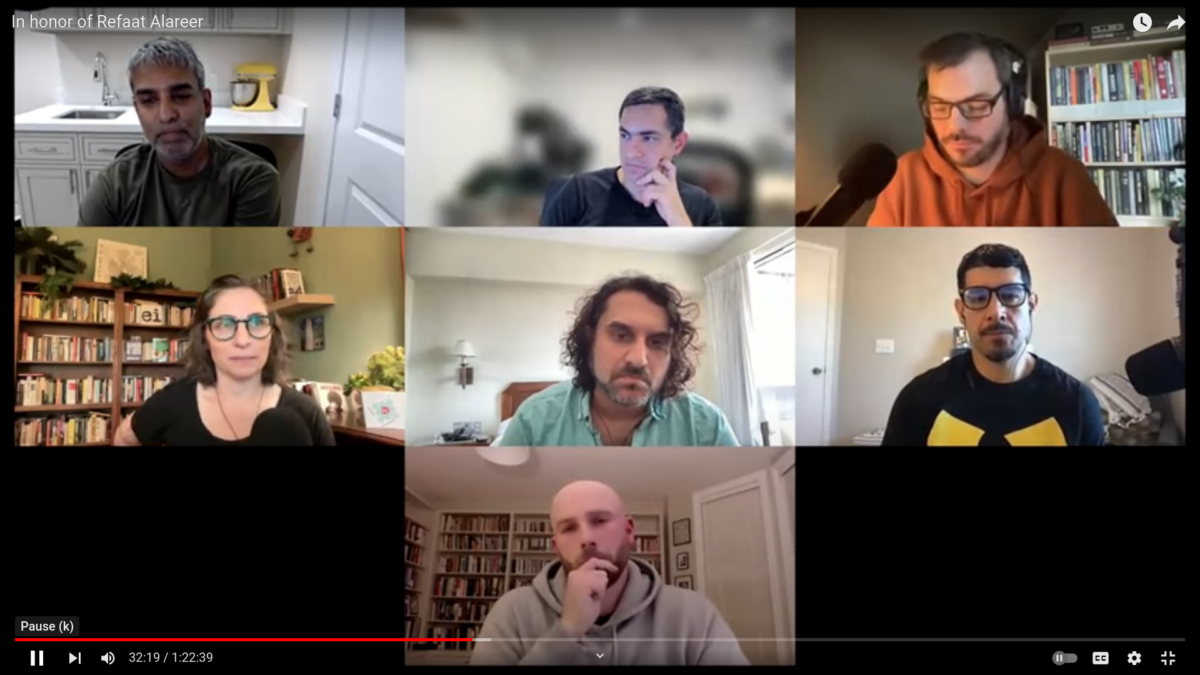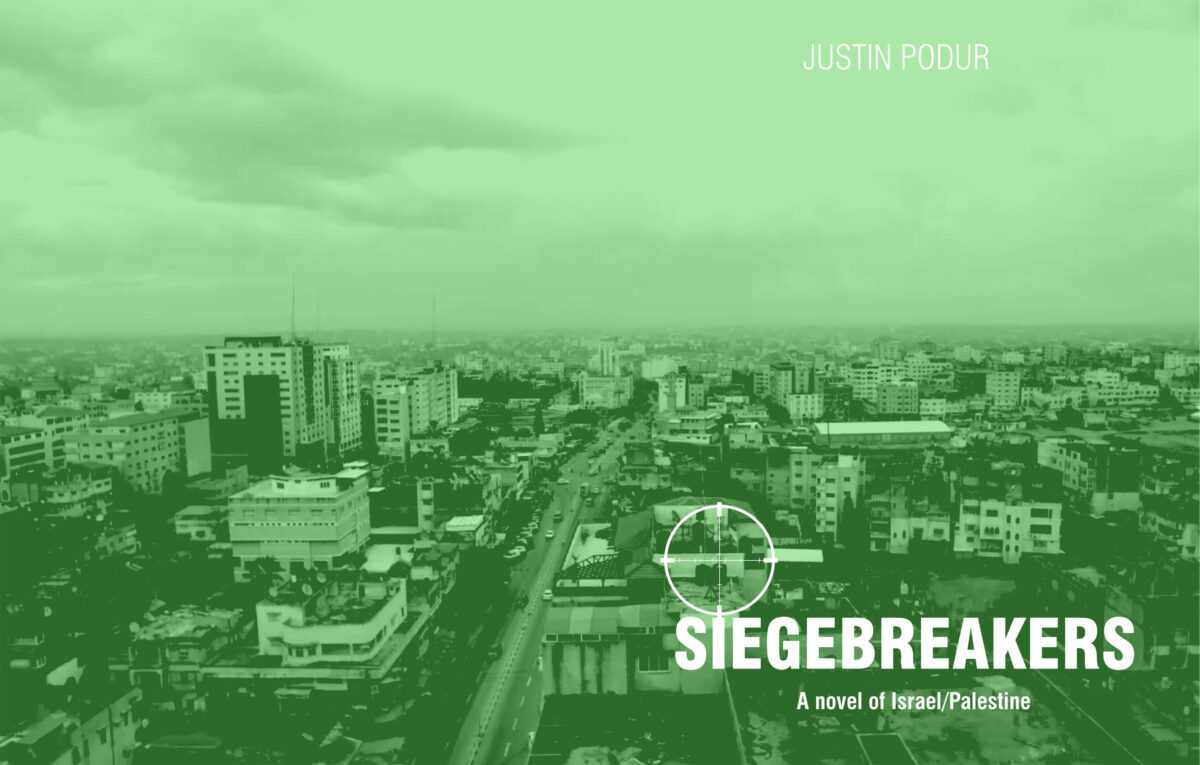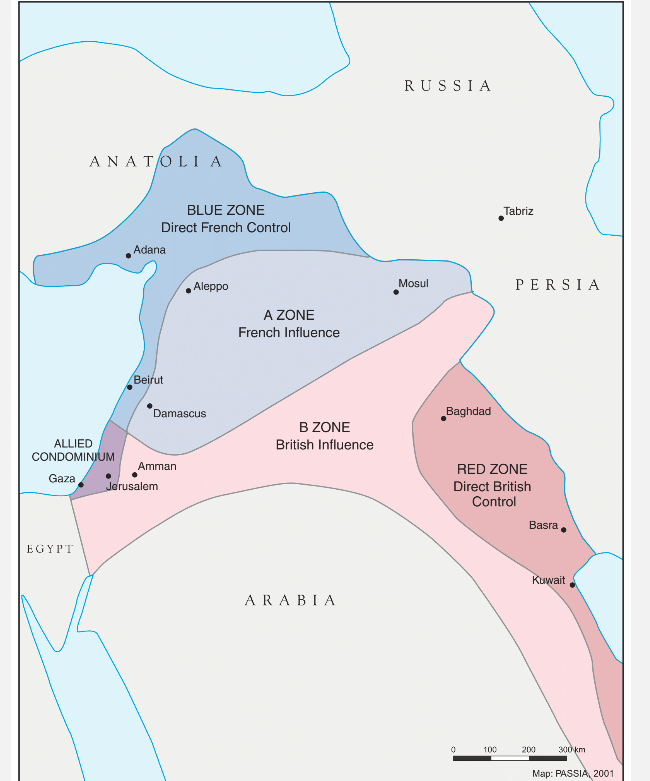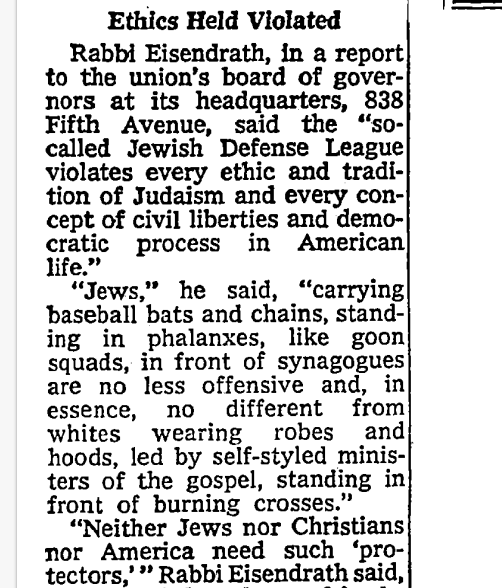Our usual group gets together to talk about the Gaza War, this time we all share some words about literature prof, teacher, poet and hero Refaat Alareer, assassinated by Israel a couple of days ago. Some discussion of military tactics and strategies as always.
Tag: Gaza
AEP 97: Special Siegebreakers Spoiler
In this special short episode, the whole plot summary of Siegebreakers, a pro-Palestine thriller novel that imagines how the Palestinians will eventually break the siege on Gaza, is SPOILED. If you don’t like spoilers, you should skip this one. If you’re the type who needs to know what happens in a book or movie before committing yourself to watching / reading, well this 12 minutes will help you decide. Also, there’s a book discussion on September 18th that will be hosted by the Marxist Education Project (discussion continues on the 23rd as well). So there’s the announcement, discount codes for the book, and the full spoiler in this short episode. Back to regular programming in the next.
Special Broadcast: Ceasefire in Gaza
We reconvene the roundtable to discuss the ceasefire in Gaza. Nora Barrows-Friedman is an editor at the Electronic Intifada, Jon Elmer is a journalist who lived for years in Gaza, Justin Podur is the author of Siegebreakers, and Tarek Loubani is an emergency room doctor, often at Shifa, Gaza’s main hospital.
This broadcast is a co-production of The Brief Podcast and The Anti-Empire Project. Production by Pierre Loiselle and music by Greg Wilson.
Episode: Ceasefire in Palestine (special broadcast)
Date: 26 May 2021 | Length: 51:12
Monsters in our Midst 4: Would Gandhi Support Palestinian Armed Resistance?
Concluding the miniseries by Dan Freeman-Maloy.
Gandhi’s slogan was “Do or Die”, following Byron’s poem about the (pointless) Charge of the Light Brigade during the Crimean War. He emphasized that he would prefer violent resistance to cowardice or surrender. So, the question arises: would Gandhi have supported armed resistance in Palestine?
Monsters in our Midst 3: What is the Gaza Strip? Why Support the Resistance?
The focus on Hamas is a product of the rolling amnesia of empire, as if the history of Israeli attacks on Palestinians can be narrowed to the last few decades, then distorted further. Against this tendency, this episode reviews the basic historical and geographic background to this crisis, showing the place of Palestine and the Gaza Strip in the history of imperial expansion, and placing the current horrors in their essential context.
Monsters in our Midst 2: Anti-Black and Anti-Palestinian Racism are Connected
Episode 2 of a mini-series on Israel/Palestine by Dan Freeman-Maloy.
Sometimes the connections are obvious. The American-Israeli Meir Kahane, for example, worked as a white-backlash activist in the United States, targeting Black-led social movements, before moving to Palestine and coaching settlers to kill Palestinians, with what Jewish organizations across the world then denounced as racist hate and violence.
More generally, the Scramble for Africa — that is, the classical period of white colonization of the African continent — was part and parcel of the same imperial expansion that swept across Palestine during World War I. It was then that Britain extended its reach across Palestine and that the road to Israeli statehood was paved. Theme by theme, European settler colonial politics that had been crafted in the Americas and in Africa were applied to Palestine. The association of the Zionist movement with British settler polities (the “Dominions”) was once proud.
The connections are manifold. European colonization in Africa and West Asia (or the Middle East) shared key patterns and was shaped by some of the same personnel, just as national liberation movements in both areas have a rich history of exchanges. In this episode, we focus on some of the shared patterns of deception that empire developed as it told moralizing tales about its righteousness in different parts of the world.
As Malcolm X phrased it: “if you study how they do it here, then you’ll know how they do it over here. It’s the same game going all the time.”
Cease Fire, Resume Genocide: An Interview with Dr. Jacob Smith*
Dr. Jacob Smith (name changed) is a North American physician who has visited Gaza several times, working at several hospitals there in both clinical and training roles. I spoke with him about the medical system in Gaza and the state of Gaza under the current, post August-2014 intensified siege.
Justin Podur: Describe your work in Gaza’s medical system.
Jacob Smith: I was initially asked several years ago by the Ministry of Health in Gaza to participate in a needs assessment for one of the subspecialties. At the time I knew very little about Gaza, wasn’t involved in politics, and knew very little even about the history of the region. As a physician what I saw was a tremendously poor humanitarian situation that was in large part man-made. Most times humanitarian crises result from earthquakes, tornadoes, natural disasters. This disaster is entirely man-made. The health system is the area I’m exposed to most. But it’s one small nidus of a multifactorial problem. The health system needs work, but so does the water system, so does rebuilding people’s homes, there are huge needs in every area. Politically, the most important thing would be getting the borders open so people can export and import – these are simple things that people in a Western society simply take for granted. The blockade prevents medical supplies, medications, training of doctors. The actualization of an independent, sovereign people requires that they can interact with other people. To be able to be empowered to overcome poverty and other challenges, is really not something that they can do under blockade.
JP: Give us some examples of how the siege plays out in the medical system.
JS: I’ll give you an example of what happened in the last offensive. Some specialized treatments like cancer treatment, kidney dialysis, and blood transfusions are only available in Shifa hospital in Gaza City. These treatments are regular, life-saving, and necessary to prolong people’s lives. In the last offensive, people from Northern Gaza were unable to get to Gaza City for these treatments because the road network was destroyed. Those people simply died. Just like that. Another very simple example: when I was there a few years ago, I met a young man in his early twenties who had been exposed to white phosphorus. As a complication of that, he ended up being in the intensive care unit quite a long time. I saw him several years after his exposure, which was probably during Cast Lead in 2008/9. He has chronic illness, he’s unable to find work. During his time in intensive care, the hospital lost power, so he’s lucky to even be alive, but he is a casualty of white phosphorus. In the most recent Israeli offensive a lot of the equipment just stopped because of power cuts. If you’re on a respirator and the power dies, you die. And during the most recent offensive, people who were the sickest – in the intensive care unit – intermittently, the power went down, and you had to hope the generators kicked in. Otherwise the person died. It was that simple. During the offensive, the one time when critical supplies need to come in, this is the time that none of the supplies were available. People were ingenious, trying to find solutions, but there are limits to that. Many people died from things that were easily preventable.
JP: I think it would be worth our time for you to tell us a bit about Palestinian ingenuity. It’s a part of the story people rarely get to hear about.
JS: Just to give you an example, when I visited the dialysis unit, one thing they have is old equipment that is essentially breaking down, broken down to the point where anywhere else, it would be thrown out. But because of the needs, the major hospital in Gaza has designed a system where there are now five shifts – for perspective, you should know no North American facility runs more than three shifts – they run five shifts and they have modified the regime to assure that every patient’s needs are met. They’ve modified the scheduling system to ensure there are nurses available 24 hours a day. I’ve never heard of that happening anywhere else. Another well-publicized example. When the power runs out, many of the Palestinian people will use cooking oil in their cars, which works effectively. The hospitals do the same when they run out of diesel. They use cooking oil to fuel the generators. There are countless examples of running out of electricity supply in the hospital, and setting up someone’s car battery so that the intensive care unit, OR, and the ER can continue to operate. Now there’s a big push, and one of the most empowering programs now is to empower each of the hospitals with solar power similar to as has been done in a couple of hospitals in Haiti. You’ll find countless examples. The level of knowledge of medical students, in terms of book knowledge, was higher than my North American students. But the Palestinian students don’t have the opportunities to go on exchange, develop experience and training outside of Gaza. They have everything they can get in Gaza – they are brilliant students – but they are stuck under the blockade.
JP: And as inventive as the Palestinians are, the occupation is also endlessly inventive in attacks and deprivations. How do they raise the costs for internationals to try to help in Gaza?
JS: So long as the blockade continues, Gaza is in a situation where they really need international help. So long as they are blocked, they need foreign aid, they need NGOs, they need money, reconstruction of hospitals, homes, UN buildings, everything. And yet at the one time that they need the world more than ever before, the world is grossly absent. And it is not simply that the world doesn’t want to be there. Israel (and, it must be said, Egypt) has made it almost impossible to get in and out of Gaza. If you’re an NGO and you’re trying to determine the most productive use of your time and money, you’ll go to a place that’s easier to get in and out. It is hard to get in, hard to get out, it’s intentional delays to deprive people of the ability to do good work. If you apply to go through Israel, they’ll delay or refuse your COGAT permission. Many have been refused without explanation and aren’t allowed back – for no reason. Mads Gilbert is an example.
I know of doctors who have been rejected multiple times, spent thousands in legal fees, took their case to the Supreme Court of Israel, and were finally granted permission through the Supreme Court of Israel. Even after getting permission from Supreme Court, the border officials make entry and exit especially difficult and humiliating.
When I was leaving Israel via Ben Gurion, the authorities insisted I write my facebook, home address, work address, phone numbers. I had my luggage dumped on the floor, every item in my bag was swabbed, I had to go through the X-ray twice, I was strip searched, and had my private parts patted down. This is routine for anyone entering and exiting Gaza for medical relief work. You are intentionally made to feel like a criminal, like you’re doing something wrong by going to Gaza, that the mere act of being present there makes you a criminal. As you go through it, even if you know that’s happening, human nature dictates that you’ll start to think, well, there are a lot of places that need humanitarian work, you’ll be inclined to go somewhere else next time, which means you’ll have done exactly what the Israelis wanted you to do. As a physican, most physicians will feel they have better things to do with their time. And that’s a part of why development has happened at a snail’s pace.
And consider me, as a white North American physician, I’m not used to this treatment, but part of the sadness is, if I was Palestinian, this would happen all the time, I wouldn’t be telling this story, and much worse would happen to me – I’d be detained, or jailed, or tortured, and no one would know.
JP: You mentioned Egypt. It’s not just Israel making it difficult for people to get in. It’s also the Sisi dictatorship in Egypt.
JS: I visited Gaza when Morsi was president of Egypt. At that time, the Rafah border crossing was mostly open. There was also a tunnel system that served as a lifeline of medical supplies into Gaza. It was easier for people to go in and out via Rafah for specialized medical care. That said, it was still not accessible to everyone. It was accessible to people who had the means – in a territory where there is more than 50% unemployment, that was still a major barrier. But now, in the Sisi era, it’s simply impossible to get out. Several years ago, during one of my visits, you could see NGO people everywhere: UN, MSF, Red Crescent from Turkey. They were everywhere, there were projects, there were people. Now they are almost invisible.
Much of the money that was pledged, the overwhelming majority, has never got in. Reconstruction efforts are essentially nonexistent. The hospitals that were most visible from the international perspective – in Gaza City – were rebuilt first. Not because they were strategic for human health, but because they were the most likely to please Israel, to help Israel’s international reputation. The pediatric hospital, which was bombed in August 2014, was rebuilt first.
So far, the reconstruction effort is going at a rate that will take 100 years to repair the damage just from the most recent conflict, never mind the conflicts before that. The most basic necessities are in short supply. The majority of the water is undrinkable because of damage to water treatment plants and lack of sewage treatment. Electricity outages range anywhere from 12 to 20 hours a day. Because of the displacement of over 100,000 people, many of these people are living in congested housing. We’re seeing a very high rate of people living in close proximity. People are literally dying of diarrhea, children have died of hypothermia because they can’t get heat in their homes.
Each of the things that I’m describing, we’re talking about an area where the average person in Gaza lives on less than $1500 per year. If you move less than a mile away in Israel, that figure is over $35,000 per year. The reason this exists is entirely man-made. The people within Gaza are motivated, determined to be independent and have their own health care system that they develop and that they optimize. The reason this is not happening is solely because of the occupation and a blockade that forbids supplies, and rather than the very rapid genocidal campaign of the war, after the ceasefire none of the conditions have been respected.
My dream is that Gaza would have an independent health care system that would be run by Gaza that wouldn’t be dependent on foreign aid, not dependent allowing supplies in through the occupier. That’s completely possible. The desire, the expertise, the determination, are all there on the Palestinian side. But on the Israeli and Egyptian sides, there is opposition. And internationally, those who want to help haven’t been strong enough to overcome this opposition. One of the most frustrating things for me, is, to see the potential. I have to perceive things as, what’s the potential if we overcome those barriers. That has to be the way that we think. What’s the ideal situation? A health system designed by, for, and managed by physicians and leaders in Gaza. They are more than capable of doing it if the world allowed them.
This content was originally published by teleSUR at the following address:
http://www.telesurtv.net/english/opinion/Cease-Fire-Resume-Genocide-An-interview-with-Dr.-Jacob-Smith-20150311-0031.html. If you intend to use it, please cite the source and provide a link to the original article. www.teleSURtv.net/english
Pillar of Defense Deaths until November 18
A map of deaths from Israel’s Pillar of Defense operation, inspired by the UK Guardian’s map of “incidents”. I added a timeline and removed anything that didn’t result in deaths, on the basis that war is mainly a collection of deaths, and not a collection of “incidents”. The geographical information could be more accurate, and I am happy to correct if anyone sends me corrections (I’ll also be updating as time goes on, using Maan News’s excellent feed). 2D version without timeline:
3D version with timeline (requires google earth plugin), or download the KML file to your computer and view it in google earth.
And the Google Fusion Table, another easy way to get this data, below.
Thanks to Jon Elmer for putting me on to the relevant data sources.
Dan Freeman-Maloy on Israel’s Flotilla Raid
Dan discusses the international aspects of the raid. His website is notesonhypocrisy.com
Israel’s Flotilla Massacre
Overnight, Israeli commandos attacked an aid flotilla in the high seas, some 65km from Israel. The commandos killed at least 10 people and injured dozens of others, mostly Turkish nonviolent activists bound for Gaza who were aiming to break Israel’s siege with humanitarian supplies. Israel attacked all of the ships in the flotilla, but the killings seem to have happened on the flagship Mavi Marmari.




